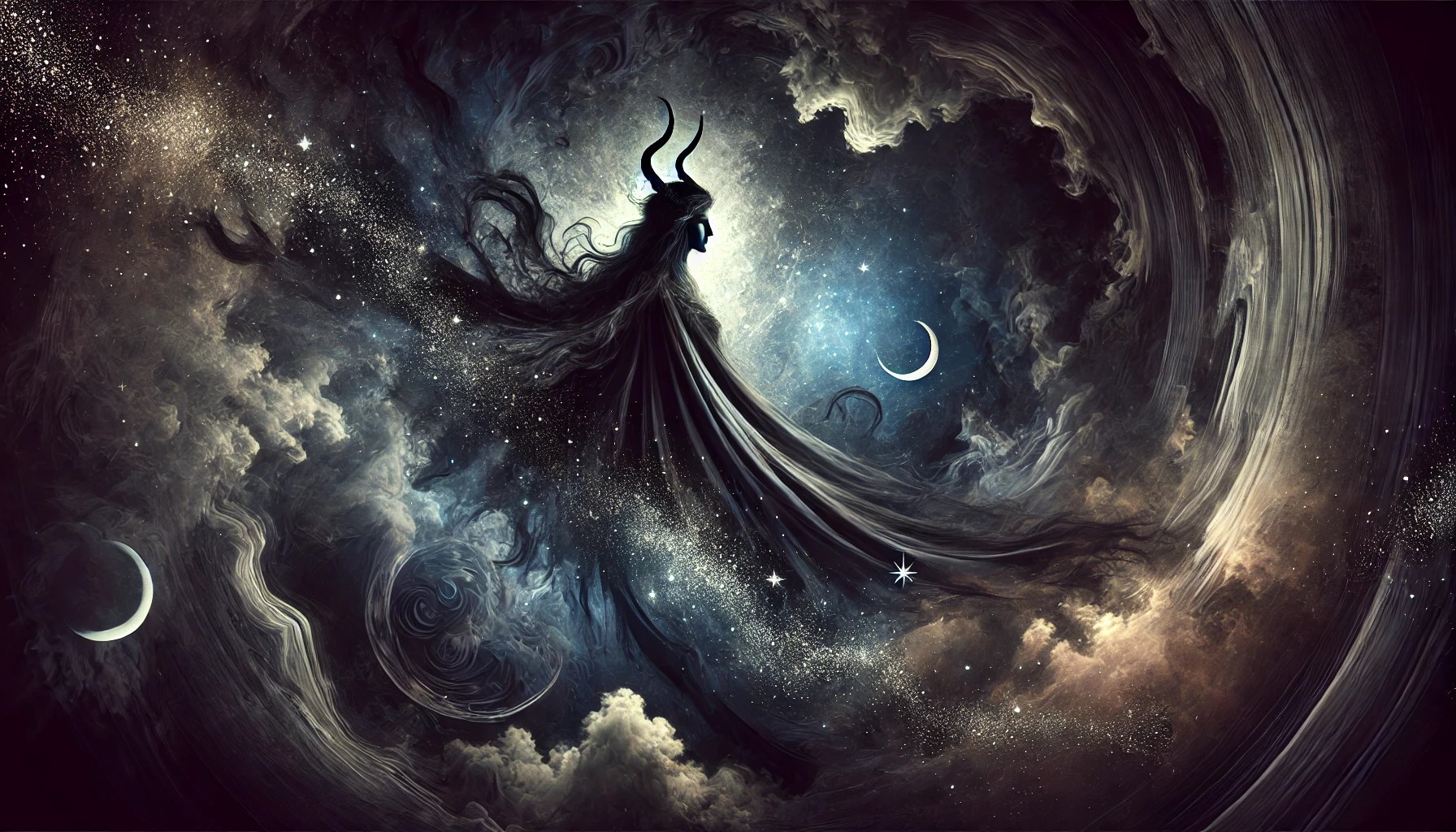Nyx: The Primordial Goddess of Night in Greek Mythology
In the vast and intricate world of Greek mythology, Nyx (Νύξ) stands out as one of the most powerful and enigmatic primordial deities. As the personification of night, Nyx embodies the darkness and mystery that envelops the world after sunset. Her role extends beyond the mere representation of night; she is a figure of immense power and influence, revered and feared by gods and mortals alike. This blog post delves into the origins, characteristics, and significance of Nyx, shedding light on her role in the cosmic order and her enduring legacy in mythology.

Origins and Nature of Nyx
Nyx is a primordial deity, one of the first beings to emerge from Chaos, the original void from which all creation sprang. According to Hesiod’s Theogony, Nyx came into existence alongside other primordial entities like Gaia (Earth), Tartarus (the abyss), and Eros (love). Her presence signifies the arrival of night and darkness, essential aspects of the natural and cosmic order.
- Primordial Status: Nyx’s emergence from Chaos places her among the most ancient and fundamental deities in Greek mythology. She embodies the elemental force of night, a necessary counterpart to the daylight personified by Hemera (Day).

Characteristics and Symbolism of Nyx
- Personification of Night: Nyx is often depicted as a majestic and shadowy female figure, embodying the beauty and mystery of the night. She is sometimes shown with a dark, flowing cloak adorned with stars, symbolizing the night sky.
- Cosmic Influence: As the goddess of night, Nyx wields significant power over both the heavens and the earth. Her arrival brings darkness, offering rest and respite but also invoking fear and uncertainty.
- Mother of Deities: Nyx is known for her numerous offspring, many of whom are personifications of various dark and mysterious aspects of existence. Her children include Hypnos (Sleep), Thanatos (Death), Moros (Doom), and the Keres (death-spirits).
Role in Greek Cosmogony
Nyx plays a crucial role in the structure and balance of the Greek cosmos:
- Bringer of Night: Nyx’s primary role is to bring the night, marking the transition from day to darkness. This cyclical process is essential for maintaining the natural order and balance.
- Influence Over Gods and Mortals: Nyx’s power is such that even the Olympian gods hold her in awe. Zeus himself respects Nyx, knowing that her wrath could have dire consequences.
Mythological Role of Nyx
Nyx’s presence is felt in various mythological narratives:
- In Hesiod’s Theogony: Nyx is described as one of the primordial deities born from Chaos. She is the mother of many significant deities and personifications, highlighting her role as a generative force in the cosmos.
- In Homer's Iliad: Nyx’s influence is acknowledged by Zeus, who avoids provoking her wrath, indicating her revered and feared status among the gods.
- In Orphic Hymns: Nyx is invoked in the Orphic hymns, which praise her as a powerful and all-encompassing deity, the source of cosmic order and the cycle of time.
Worship and Cult of Nyx
Nyx was not widely worshipped in the same manner as Olympian gods, but she held a significant place in ancient Greek religion:
- Chthonic Rituals: As a chthonic deity associated with the night and the underworld, Nyx was acknowledged in rituals meant to honor or appease the gods of the dark and mysterious realms.
- Oracles and Divination: Nyx’s association with night and mystery made her a relevant figure in oracles and divination practices, where insights were often sought during the night.
Artistic and Literary Depictions of Nyx
- Artistic Representations: In ancient art, Nyx is typically portrayed as a dark, ethereal figure surrounded by stars and shadows. Her imagery often includes elements like a dark cloak or chariot, emphasizing her role as the bringer of night.
- Literary Descriptions: Nyx is mentioned in various literary works, including Hesiod’s Theogony and Homer’s Iliad. These descriptions emphasize her power, beauty, and the respect she commands from other deities.
Modern Interpretations of Nyx
Nyx continues to inspire contemporary culture and thought:
- Symbol of Mystery and Power: In modern contexts, Nyx represents the mysteries of the night and the power of darkness. Her imagery is often used in literature, art, and popular culture to evoke a sense of enchantment and fear.
- Psychological Metaphor: Nyx’s association with night and darkness makes her a fitting metaphor for the unconscious mind, the unknown, and the hidden aspects of existence.
Comparative Mythology: Nyx Across Cultures
Similar concepts to Nyx are found in various mythologies:
- Roman Nox: In Roman mythology, Nox is the equivalent of Nyx, embodying the night. Her attributes and significance closely mirror those of Nyx.
- Egyptian Nut: Nut, the Egyptian goddess of the sky and stars, shares similarities with Nyx in her association with the night and the celestial realm.
Conclusion: Nyx’s Enduring Legacy
Nyx, the primordial goddess of night, holds a unique and powerful place in Greek mythology. As the embodiment of night and darkness, she represents both the beauty and the mystery of the cosmos. Nyx’s influence extends beyond the mere concept of night; she is a generative force and a figure of immense power and reverence. Today, Nyx continues to captivate and inspire, reflecting the timeless allure and mystery of the night.
Explore More About Greek Mythology: Dive deeper into the timeless tales and intricate characters of Greek mythology, uncovering the rich narratives that have shaped cultural understanding for centuries.





Comments
Post a Comment